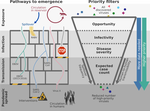Predicting zoonotic potential of viruses: where are we?
The prospect of identifying high-risk viruses and designing interventions to pre-empt their emergence into human populations is enticing, but controversial, particularly when used to justify large-scale virus discovery initiatives. We review the current state of these efforts, point out unaddressed gaps, and argue that efforts to predict zoonoses provide unique research value that goes beyond their stated – and as yet unrealised – goal of pandemic prevention.
More
Network embedding unveils the hidden interactions in the mammalian virome
We describe a novel bipartite network prediction method, applying it to a global database of mammal-virus interactions. Using predictions from this method to supplement our current limited knowledge of virus host range improves the accuracy of predictions of human infection from viral genome features.
More
Mammal virus diversity estimates are unstable due to accelerating discovery effort
While host-virus association data form the backbone of a growing body of comparative work in virus ecology and evolution, knowledge of the wildlife virome is inherently constrained by historical discovery effort. This has led to concern about the reliability of conclusions drawn from currently-available data. By analysing a dataset of discovery dates for 6,571 unique mammal host-virus associations, we show that inference of relative viral richness across host species has been unstable over time. We therefore advise caution to avoid overinterpreting patterns in current data.
More
Identifying and prioritizing potential human-infecting viruses from their genome sequences
We describe a machine learning model that identifies candidate zoonoses using evolutionary signals of host range encoded in viral genomes. This allows identification of high-risk viruses immediately upon discovery, increasing both the feasibility and likelihood of downstream virological and ecological characterization and allowing for evidence-driven virus surveillance.
More
Characterizing and evaluating the zoonotic potential of novel viruses discovered in vampire bats
A case study in evaluating the zoonotic potential of newly-discoved viruses using molecular sequencing data. We highlight the value of evaluating zoonotic potential beyond ad hoc consideration of phylogeny and provide surveillance recommendations for novel viruses in a wildlife host which has frequent contact with humans and domestic animals.
More

